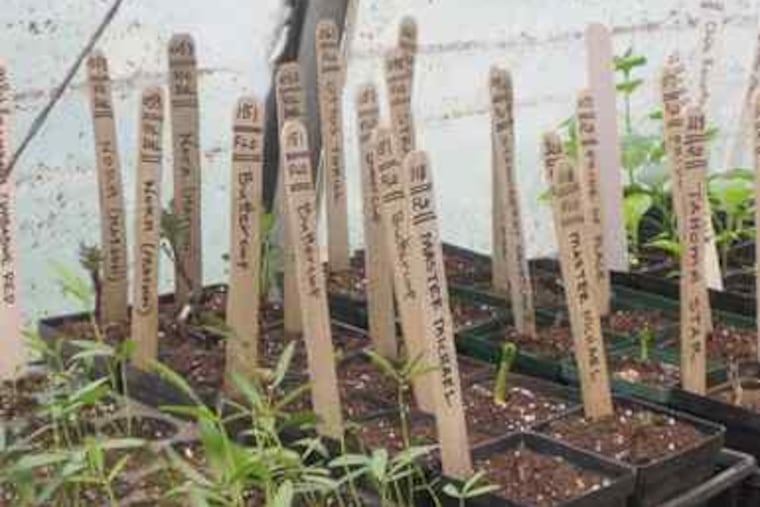Tending seeds and traditions
Two of many things on William Woys Weaver's plate: Heirlooms, and cataloging state foodways.

One morning last week, the force of nature that is William Woys Weaver was getting his hands dirty at Roughwood, his rustic manse in Devon, planting flats of heritage seeds that had been tottering dangerously close to expiration.
Various pole limas were on the menu this particular day - Sadie's Climbing Baby Lima, among them, and one of Doctor Martin's coveted Chester County beauties (once sold for a whopping 25 cents a seed), and the purple Blue Shackamaxon Treaty Bean, and old Quaker beans, and seeds that his late grandmother had squirreled away in jars in her own freezer.
Out of the earth, of course, seeds don't last forever. So if an envelope of one of Weaver's inventory (which at 3,000 heirloom seeds is something of a Fort Knox of American germplasm) is labeled 2007, you can probably take a pass. But if it's dated 2006, watch out: "You better get it in the ground."
This is one of Weaver's cyclical chores, and last week he was being ably assisted by Nancy Wygant, a thin braid trailing down her back. She oversees the kitchen garden at Bartram's Garden along the banks of the lower Schuylkill.
But as usual he had an anxiety-inducing number of other plates spinning - leading garden seminars, writing books on food history (his latest, his 15th, is a lavishly illustrated volume titled Culinary Ephemera, due out in October from University of California Press), and this summer, launching a dauntingly ambitious effort to create a center for the study of local and regional foods, and "food tourism."
This latest project - he calls it the Keystone Center, based at Drexel University, where he is on the adjunct faculty - follows the classic Weaver modus operandi: Bite off more than is comfortable to chew. Bemoan the crushing weight of it all. (He maintains, for example, an ancient Indian corn variety - singularly, now - that even tribal elders rely on him to provide: "I'm the keeper. But I don't want the burden; I'm not Noah!") Thrive on the ensuing chaos.
Weaver was in typical, scattershot form as the seed-sorting progressed - showing off an apparently still-edible Quaker pie squash he'd harvested last August; demonstrating how he'd had to stand in stocking feet on a hand-carved, platter-sized cookie mold to make an impression on the dough (the resulting photo will be on the cover of summer's Antiques magazine); exhibiting a letter, albeit of the form genre, he'd just received from Michelle Obama: He'd written to her suggesting more heirloom vegetables in the White House garden to provide history lessons that might be a powerful teaching tool.
It is hard to pinpoint exactly when the Keystone Center will be up and viably functioning. Weaver is hoping for a website at least by midsummer. And soon an exhaustive catalog of foodways - from Lake Erie to the muskrat feeds of South Jersey - in Philadelphia's orbit.
But two things are fairly certain. First, this will be personal. It grows directly out of Weaver's preservationist ethos: He has already identified 1,600 dishes in Pennsylvania Dutch country alone that aren't commonly found elsewhere - from poor-man's sweet buckwheat bread, to a tangy pepper hash, to a creamed chicken and waffles, all with backstories.
Like the seeds on the edge of expiration, he argues, our diverse food traditions face the same ignoble end unless they're given an active second life. In that regard, he'll publish recipes and serve versions in his own kitchen.
In fact, he does that for lunch this very day, offering slices of light, tender-crumbed buckwheat bread, a juicy pepper hash (with caraway seed), and schales, a baked cabbage dish.
Second, the center is bound to be prickly and fiercely, even crankily, independent.
"People are looking for authentic now," he says. So his definition of "food tourism" is to produce a guide to truly artisanal producers, not to feed "Lancaster tourism propaganda."
And of course there is, in the enduring tradition of William Woys Weaver, no bone too small to pick: Chicken pot pie isn't Pennsylvania Dutch! The Whoopie Pie was a Boston theater promo!
Someone mentions, toward the end of lunch, the uniquely Philadelphian style of coating fried salt oysters, using fine cracker meal.
"Dust!" Weaver corrects. "Cracker dust! Not meal!